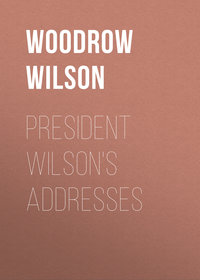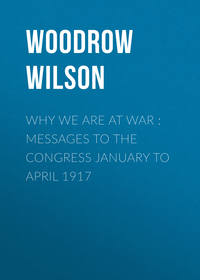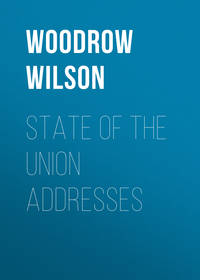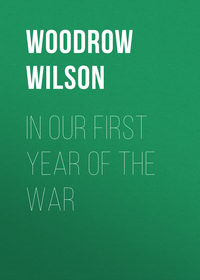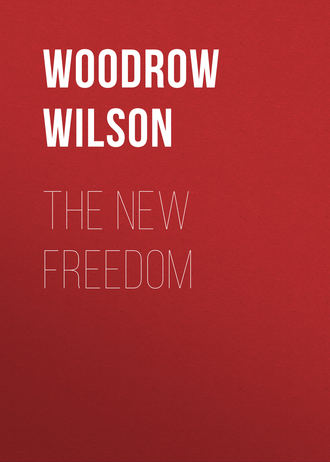 полная версия
полная версияThe New Freedom
But if you want to know how far brains go, as things now are, suppose you try to match your better wares against these gentlemen, and see them undersell you before your market is any bigger than the locality and make it absolutely impossible for you to get a fast foothold. If you want to know how brains count, originate some invention which will improve the kind of machinery they are using, and then see if you can borrow enough money to manufacture it. You may be offered something for your patent by the corporation,—which will perhaps lock it up in a safe and go on using the old machinery; but you will not be allowed to manufacture. I know men who have tried it, and they could not get the money, because the great money lenders of this country are in the arrangement with the great manufacturers of this country, and they do not propose to see their control of the market interfered with by outsiders. And who are outsiders? Why, all the rest of the people of the United States are outsiders.
They are rapidly making us outsiders with respect even of the things that come from the bosom of the earth, and which belong to us in a peculiar sense. Certain monopolies in this country have gained almost complete control of the raw material, chiefly in the mines, out of which the great body of manufactures are carried on, and they now discriminate, when they will, in the sale of that raw material between those who are rivals of the monopoly and those who submit to the monopoly. We must soon come to the point where we shall say to the men who own these essentials of industry that they have got to part with these essentials by sale to all citizens of the United States with the same readiness and upon the same terms. Or else we shall tie up the resources of this country under private control in such fashion as will make our independent development absolutely impossible.
There is another injustice that monopoly engages in. The trust that deals in the cruder products which are to be transformed into the more elaborate manufactures often will not sell these crude products except upon the terms of monopoly,—that is to say, the people that deal with them must buy exclusively from them. And so again you have the lines of development tied up and the connections of development knotted and fastened so that you cannot wrench them apart.
Again, the manufacturing monopolies are so interlaced in their personal relationships with the great shipping interests of this country, and with the great railroads, that they can often largely determine the rates of shipment.
The people of this country are being very subtly dealt with. You know, of course, that, unless our Commerce Commissions are absolutely sleepless, you can get rebates without calling them such at all. The most complicated study I know of is the classification of freight by the railway company. If I wanted to make a special rate on a special thing, all I should have to do is to put it in a special class in the freight classification, and the trick is done. And when you reflect that the twenty-four men who control the United States Steel Corporation, for example, are either presidents or vice-presidents or directors in 55 per cent. of the railways of the United States, reckoning by the valuation of those railroads and the amount of their stock and bonds, you know just how close the whole thing is knitted together in our industrial system, and how great the temptation is. These twenty-four gentlemen administer that corporation as if it belonged to them. The amazing thing to me is that the people of the United States have not seen that the administration of a great business like that is not a private affair; it is a public affair.
I have been told by a great many men that the idea I have, that by restoring competition you can restore industrial freedom, is based upon a failure to observe the actual happenings of the last decades in this country; because, they say, it is just free competition that has made it possible for the big to crush the little.
I reply, it is not free competition that has done that; it is illicit competition. It is competition of the kind that the law ought to stop, and can stop,—this crushing of the little man.
You know, of course, how the little man is crushed by the trusts. He gets a local market. The big concerns come in and undersell him in his local market, and that is the only market he has; if he cannot make a profit there, he is killed. They can make a profit all through the rest of the Union, while they are underselling him in his locality, and recouping themselves by what they can earn elsewhere. Thus their competitors can be put out of business, one by one, wherever they dare to show a head. Inasmuch as they rise up only one by one, these big concerns can see to it that new competitors never come into the larger field. You have to begin somewhere. You can't begin in space. You can't begin in an airship. You have got to begin in some community. Your market has got to be your neighbors first and those who know you there. But unless you have unlimited capital (which of course you wouldn't have when you were beginning) or unlimited credit (which these gentlemen can see to it that you shan't get), they can kill you out in your local market any time they try, on the same basis exactly as that on which they beat organized labor; for they can sell at a loss in your market because they are selling at a profit everywhere else, and they can recoup the losses by which they beat you by the profits which they make in fields where they have beaten other fellows and put them out. If ever a competitor who by good luck has plenty of money does break into the wider market, then the trust has to buy him out, paying three or four times what the business is worth. Following such a purchase it has got to pay the interest on the price it has paid for the business, and it has got to tax the whole people of the United States, in order to pay the interest on what it borrowed to do that, or on the stocks and bonds it issued to do it with. Therefore the big trusts, the big combinations, are the most wasteful, the most uneconomical, and, after they pass a certain size, the most inefficient, way of conducting the industries of this country.
A notable example is the way in which Mr. Carnegie was bought out of the steel business. Mr. Carnegie could build better mills and make better steel rails and make them cheaper than anybody else connected with what afterward became the United States Steel Corporation. They didn't dare leave him outside. He had so much more brains in finding out the best processes; he had so much more shrewdness in surrounding himself with the most successful assistants; he knew so well when a young man who came into his employ was fit for promotion and was ripe to put at the head of some branch of his business and was sure to make good, that he could undersell every mother's son of them in the market for steel rails. And they bought him out at a price that amounted to three or four times,—I believe actually five times,—the estimated value of his properties and of his business, because they couldn't beat him in competition. And then in what they charged afterward for their product,—the product of his mills included,—they made us pay the interest on the four or five times the difference.
That is the difference between a big business and a trust. A trust is an arrangement to get rid of competition, and a big business is a business that has survived competition by conquering in the field of intelligence and economy. A trust does not bring efficiency to the aid of business; it buys efficiency out of business. I am for big business, and I am against the trusts. Any man who can survive by his brains, any man who can put the others out of the business by making the thing cheaper to the consumer at the same time that he is increasing its intrinsic value and quality, I take off my hat to, and I say: "You are the man who can build up the United States, and I wish there were more of you."
There will not be more, unless we find a way to prevent monopoly. You know perfectly well that a trust business staggering under a capitalization many times too big is not a business that can afford to admit competitors into the field; because the minute an economical business, a business with its capital down to hard pan, with every ounce of its capital working, comes into the field against such an overloaded corporation, it will inevitably beat it and undersell it; therefore it is to the interest of these gentlemen that monopoly be maintained. They cannot rule the markets of the world in any way but by monopoly. It is not surprising to find them helping to found a new party with a fine program of benevolence, but also with a tolerant acceptance of monopoly.
There is another matter to which we must direct our attention, whether we like or not. I do not take these things into my mouth because they please my palate; I do not talk about them because I want to attack anybody or upset anything; I talk about them because only by open speech about them among ourselves shall we learn what the facts are.
You will notice from a recent investigation that things like this take place: A certain bank invests in certain securities. It appears from evidence that the handling of these securities was very intimately connected with the maintenance of the price of a particular commodity. Nobody ought, and in normal circumstances nobody would, for a moment think of suspecting the managers of a great bank of making such an investment in order to help those who were conducting a particular business in the United States maintain the price of their commodity; but the circumstances are not normal. It is beginning to be believed that in the big business of this country nothing is disconnected from anything else. I do not mean in this particular instance to which I have referred, and I do not have in mind to draw any inference at all, for that would be unjust; but take any investment of an industrial character by a great bank. It is known that the directorate of that bank interlaces in personnel with ten, twenty, thirty, forty, fifty, sixty boards of directors of all sorts, of railroads which handle commodities, of great groups of manufacturers which manufacture commodities, and of great merchants who distribute commodities; and the result is that every great bank is under suspicion with regard to the motive of its investments. It is at least considered possible that it is playing the game of somebody who has nothing to do with banking, but with whom some of its directors are connected and joined in interest. The ground of unrest and uneasiness, in short, on the part of the public at large, is the growing knowledge that many large undertakings are interlaced with one another, are indistinguishable from one another in personnel.
Therefore, when a small group of men approach Congress in order to induce the committee concerned to concur in certain legislation, nobody knows the ramifications of the interests which those men represent; there seems no frank and open action of public opinion in public counsel, but every man is suspected of representing some other man and it is not known where his connections begin or end.
I am one of those who have been so fortunately circumstanced that I have had the opportunity to study the way in which these things come about in complete disconnection from them, and I do not suspect that any man has deliberately planned the system. I am not so uninstructed and misinformed as to suppose that there is a deliberate and malevolent combination somewhere to dominate the government of the United States. I merely say that, by certain processes, now well known, and perhaps natural in themselves, there has come about an extraordinary and very sinister concentration in the control of business in the country.
However it has come about, it is more important still that the control of credit also has become dangerously centralized. It is the mere truth to say that the financial resources of the country are not at the command of those who do not submit to the direction and domination of small groups of capitalists who wish to keep the economic development of the country under their own eye and guidance. The great monopoly in this country is the monopoly of big credits. So long as that exists, our old variety and freedom and individual energy of development are out of the question. A great industrial nation is controlled by its system of credit. Our system of credit is privately concentrated. The growth of the nation, therefore, and all our activities are in the hands of a few men who, even if their action be honest and intended for the public interest, are necessarily concentrated upon the great undertakings in which their own money is involved and who necessarily, by very reason of their own limitations, chill and check and destroy genuine economic freedom. This is the greatest question of all, and to this statesmen must address themselves with an earnest determination to serve the long future and the true liberties of men.
This money trust, or, as it should be more properly called, this credit trust, of which Congress has begun an investigation, is no myth; it is no imaginary thing. It is not an ordinary trust like another. It doesn't do business every day. It does business only when there is occasion to do business. You can sometimes do something large when it isn't watching, but when it is watching, you can't do much. And I have seen men squeezed by it; I have seen men who, as they themselves expressed it, were put "out of business by Wall Street," because Wall Street found them inconvenient and didn't want their competition.
Let me say again that I am not impugning the motives of the men in Wall Street. They may think that that is the best way to create prosperity for the country. When you have got the market in your hand, does honesty oblige you to turn the palm upside down and empty it? If you have got the market in your hand and believe that you understand the interest of the country better than anybody else, is it patriotic to let it go? I can imagine them using this argument to themselves.
The dominating danger in this land is not the existence of great individual combinations,—that is dangerous enough in all conscience,—but the combination of the combinations,—of the railways, the manufacturing enterprises, the great mining projects, the great enterprises for the development of the natural water-powers of the country, threaded together in the personnel of a series of boards of directors into a "community of interest" more formidable than any conceivable single combination that dare appear in the open.
The organization of business has become more centralized, vastly more centralized, than the political organization of the country itself. Corporations have come to cover greater areas than states; have come to live under a greater variety of laws than the citizen himself, have excelled states in their budgets and loomed bigger than whole commonwealths in their influence over the lives and fortunes of entire communities of men. Centralized business has built up vast structures of organization and equipment which overtop all states and seem to have no match or competitor except the federal government itself.
What we have got to do,—and it is a colossal task not to be undertaken with a light head or without judgment,—what we have got to do is to disentangle this colossal "community of interest." No matter how we may purpose dealing with a single combination in restraint of trade, you will agree with me in this, that no single, avowed, combination is big enough for the United States to be afraid of; but when all the combinations are combined and this final combination is not disclosed by any process of incorporation or law, but is merely an identity of personnel, or of interest, then there is something that even the government of the nation itself might come to fear,—something for the law to pull apart, and gently, but firmly and persistently, dissect.
You know that the chemist distinguishes between a chemical combination and an amalgam. A chemical combination has done something which I cannot scientifically describe, but its molecules have become intimate with one another and have practically united, whereas an amalgam has a mere physical union created by pressure from without. Now, you can destroy that mere physical contact without hurting the individual elements, and this community of interest is an amalgam; you can break it up without hurting any one of the single interests combined. Not that I am particularly delicate of some of the interests combined,—I am not under bonds to be unduly polite to them,—but I am interested in the business of the country, and believe its integrity depends upon this dissection. I do not believe any one group of men has vision enough or genius enough to determine what the development of opportunity and the accomplishment by achievement shall be in this country.
The facts of the situation amount to this: that a comparatively small number of men control the raw material of this country; that a comparatively small number of men control the water-powers that can be made useful for the economical production of the energy to drive our machinery; that that same number of men largely control the railroads; that by agreements handed around among themselves they control prices, and that that same group of men control the larger credits of the country.
When we undertake the strategy which is going to be necessary to overcome and destroy this far-reaching system of monopoly, we are rescuing the business of this country, we are not injuring it; and when we separate the interests from each other and dismember these communities of connection, we have in mind a greater community of interest, a vaster community of interest, the community of interest that binds the virtues of all men together, that community of mankind which is broad and catholic enough to take under the sweep of its comprehension all sorts and conditions of men; that vision which sees that no society is renewed from the top but that every society is renewed from the bottom. Limit opportunity, restrict the field of originative achievement, and you have cut out the heart and root of all prosperity.
The only thing that can ever make a free country is to keep a free and hopeful heart under every jacket in it. Honest American industry has always thriven, when it has thriven at all, on freedom; it has never thriven on monopoly. It is a great deal better to shift for yourselves than to be taken care of by a great combination of capital. I, for my part, do not want to be taken care of. I would rather starve a free man than be fed a mere thing at the caprice of those who are organizing American industry as they please to organize it. I know, and every man in his heart knows, that the only way to enrich America is to make it possible for any man who has the brains to get into the game. I am not jealous of the size of any business that has grown to that size. I am not jealous of any process of growth, no matter how huge the result, provided the result was indeed obtained by the processes of wholesome development, which are the processes of efficiency, of economy, of intelligence, and of invention.
IX
BENEVOLENCE, OR JUSTICE?
The doctrine that monopoly is inevitable and that the only course open to the people of the United States is to submit to and regulate it found a champion during the campaign of 1912 in the new party, or branch of the Republican party, founded under the leadership of Mr. Roosevelt, with the conspicuous aid,—I mention him with no satirical intention, but merely to set the facts down accurately,—of Mr. George W. Perkins, organizer of the Steel Trust and the Harvester Trust, and with the support of more than three millions of citizens, many of them among the most patriotic, conscientious and high-minded men and women of the land. The fact that its acceptance of monopoly was a feature of the new party platform from which the attention of the generous and just was diverted by the charm of a social program of great attractiveness to all concerned for the amelioration of the lot of those who suffer wrong and privation, and the further fact that, even so, the platform was repudiated by the majority of the nation, render it no less necessary to reflect on the significance of the confession made for the first time by any party in the country's history. It may be useful, in order to the relief of the minds of many from an error of no small magnitude, to consider now, the heat of a presidential contest being past, exactly what it was that Mr. Roosevelt proposed.
Mr. Roosevelt attached to his platform some very splendid suggestions as to noble enterprises which we ought to undertake for the uplift of the human race; but when I hear an ambitious platform put forth, I am very much more interested in the dynamics of it than in the rhetoric of it. I have a very practical mind, and I want to know who are going to do those things and how they are going to be done. If you have read the trust plank in that platform as often as I have read it, you have found it very long, but very tolerant. It did not anywhere condemn monopoly, except in words; its essential meaning was that the trusts have been bad and must be made to be good. You know that Mr. Roosevelt long ago classified trusts for us as good and bad, and he said that he was afraid only of the bad ones. Now he does not desire that there should be any more bad ones, but proposes that they should all be made good by discipline, directly applied by a commission of executive appointment. All he explicitly complains of is lack of publicity and lack of fairness; not the exercise of power, for throughout that plank the power of the great corporations is accepted as the inevitable consequence of the modern organization of industry. All that it is proposed to do is to take them under control and regulation. The national administration having for sixteen years been virtually under the regulation of the trusts, it would be merely a family matter were the parts reversed and were the other members of the family to exercise the regulation. And the trusts, apparently, which might, in such circumstances, comfortably continue to administer our affairs under the mollifying influences of the federal government, would then, if you please, be the instrumentalities by which all the humanistic, benevolent program of the rest of that interesting platform would be carried out!
I have read and reread that plank, so as to be sure that I get it right. All that it complains of is,—and the complaint is a just one, surely,—that these gentlemen exercise their power in a way that is secret. Therefore, we must have publicity. Sometimes they are arbitrary; therefore they need regulation. Sometimes they do not consult the general interests of the community; therefore they need to be reminded of those general interests by an industrial commission. But at every turn it is the trusts who are to do us good, and not we ourselves.
Again, I absolutely protest against being put into the hands of trustees. Mr. Roosevelt's conception of government is Mr. Taft's conception, that the Presidency of the United States is the presidency of a board of directors. I am willing to admit that if the people of the United States cannot get justice for themselves, then it is high time that they should join the third party and get it from somebody else. The justice proposed is very beautiful; it is very attractive; there were planks in that platform which stir all the sympathies of the heart; they proposed things that we all want to do; but the question is, Who is going to do them? Through whose instrumentality? Are Americans ready to ask the trusts to give us in pity what we ought, in justice, to take?
The third party says that the present system of our industry and trade has come to stay. Mind you, these artificially built up things, these things that can't maintain themselves in the market without monopoly, have come to stay, and the only thing that the government can do, the only thing that the third party proposes should be done, is to set up a commission to regulate them. It accepts them. It says: "We will not undertake, it were futile to undertake, to prevent monopoly, but we will go into an arrangement by which we will make these monopolies kind to you. We will guarantee that they shall be pitiful. We will guarantee that they shall pay the right wages. We will guarantee that they shall do everything kind and public-spirited, which they have never heretofore shown the least inclination to do."


